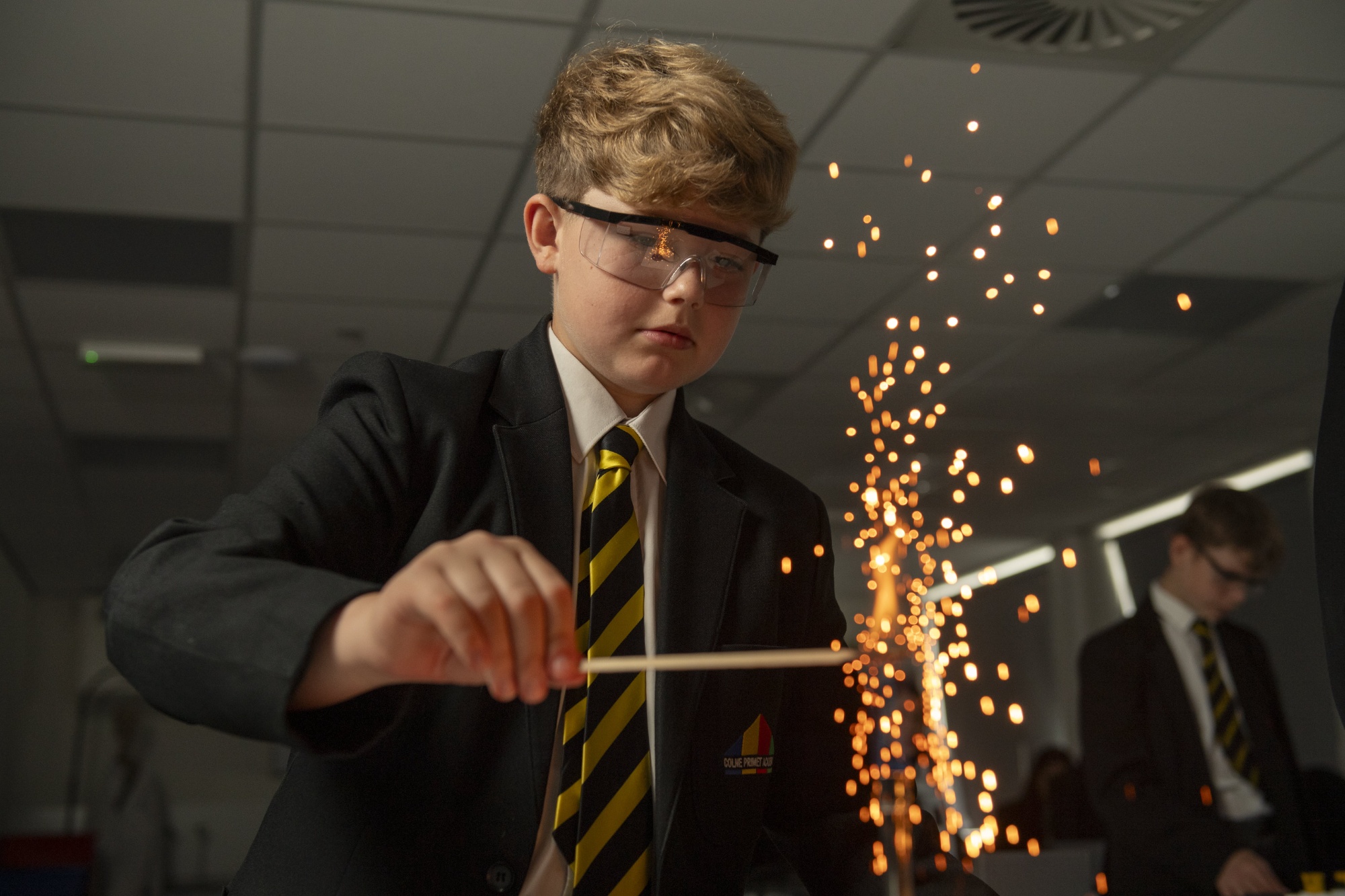Science

Year 7
Throughout Year 7, students explore the key scientific ideas that form the foundation for their studies in later years. They begin by discovering how living things are built and how forces shape the world around us. During the autumn term, they learn to use microscopes to study plant and animal cells and carry out simple investigations into friction, tension and stretching springs.
In the spring term, students move on to the building blocks of matter and the patterns that organise the periodic table, while also exploring the fascinating world of genes, DNA and human reproduction. Practical work helps them to develop investigative skills and confidence using scientific equipment.
During the summer term, students apply their knowledge to real-world contexts. They build electrical circuits, explore how energy moves, observe chemical reactions, and study how light and sound travel as waves. The year ends with a look beyond our planet, learning about the Earth, its place in the Solar System, and the cycles that shape our environment.
Across the year, lessons are highly practical and enquiry-based. Students are encouraged to think scientifically, ask questions, test ideas, and explain their findings using correct scientific language — developing curiosity, teamwork, and analytical thinking that underpin success in all sciences at GCSE and beyond.
Year 8
In Year 8, students deepen their understanding of how the living, physical and chemical worlds connect. During the autumn term they study how the body moves and breathes, explore the effects of forces and reactions in the world around them, and learn to safely test acids and alkalis through hands-on practicals.
In spring, they discover how electric current and voltage power devices, investigate how plants harness light in photosynthesis, and explore how our digestive system breaks down and absorbs nutrients. They also begin to recognise patterns in elements, compounds and mixtures and practise separating materials using filtration and distillation.
The summer term brings big, exciting ideas together: students explore waves, speed, gravity and pressure, and examine how metals and resources shape our planet. They finish the year studying how heat moves and how human activity affects the Earth’s systems.
Throughout the year, students continue to develop their scientific enquiry skills — asking questions, predicting, planning and evaluating investigations. They work collaboratively, use precise scientific language, and build the curiosity and confidence needed for success at KS4 and beyond.
Year 9
In Year 9, students begin to build the deeper scientific understanding that prepares them for GCSE study. During the autumn term they explore the structure and function of cells, learn how living organisms grow and divide, and revisit the building blocks of matter through the periodic table and atomic structure. They also study how energy is transferred by heating and develop their use of mathematical skills in quantitative chemistry.
In spring, students learn how the human body breaks down and transports nutrients, investigate how substances bond to form compounds, and explore the chemistry of energy changes. These topics strengthen key ideas about systems, reactions and energy that run throughout the GCSE course.
The summer term focuses on applying science to real-world contexts — understanding electrical circuits, how living organisms release and store energy through respiration and photosynthesis, how matter behaves at the particle level, and how genetic information is passed from one generation to the next.
Throughout the year, students work scientifically by planning and carrying out experiments, interpreting data, and communicating findings using correct scientific vocabulary. This builds the curiosity, precision and analytical thinking needed for success in GCSE Science and beyond.
Year 10
In Year 10, students build upon the foundations from KS3 to explore the major scientific principles that underpin GCSE Science. They begin the year by studying how infectious diseases spread and how the body defends itself, before applying their knowledge of particles and energy to explain electrical resistance, atomic structure, radiation and the behaviour of matter.
During the spring term, students examine the vital role of plants in ecosystems and investigate the chemistry of acids, metals and chemical reactions. They also study the properties of waves and the structure of the atom, developing confidence with abstract concepts and quantitative data.
In the summer term, students explore how living organisms maintain stable internal conditions through homeostasis, analyse the relationship between forces, motion and energy, and investigate how reaction rates can be changed in everyday and industrial processes.
Across the year, practical work and enquiry are at the heart of lessons. Students plan, carry out and evaluate experiments, interpret data, and apply mathematical skills to scientific contexts. By the end of Year 10 they are well-prepared for the demands of Year 11 and the terminal GCSE examinations.
Year 11
In Year 11, students consolidate and extend their scientific understanding as they prepare for GCSE examinations. During the autumn term they investigate how genetic information is inherited and how variation drives evolution, explore the chemistry of substances through analysis and the changing atmosphere, and examine how living organisms interact within ecosystems.
In spring, they revisit key concepts in physics and chemistry — studying waves, electricity, bonding and organic chemistry — and develop the confidence to apply knowledge across multiple contexts.
The summer term focuses on structured revision, practical mastery and exam technique. Students refine their ability to interpret data, construct explanations, and communicate scientifically, ensuring they are fully prepared for their final GCSE assessments and for progression into post-16 science study.
If you would like any more information about our Science curriculum, please contact Mr J Kinnane, Head of Science, by emailing jkinnane@colneprimet.co.uk, filling in the form on our contact us page or phoning the main office to arrange a call back.
